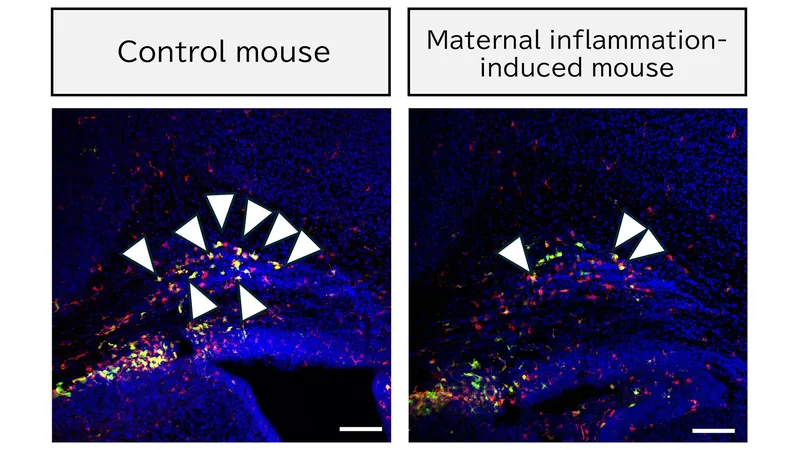
New Insights Revealed: How Maternal Inflammation Impacts Infant Brain Development!
2025-04-01
Author: John Tan
A groundbreaking study led by researchers at the Nagoya University Graduate School of Medicine in Japan has unveiled a critical mechanism linking maternal inflammation during pregnancy to delayed neurodevelopment in newborns. This research, recently published in Communications Biology, highlights the significant role played by CD11c-positive microglia—essential immune cells in the brain vital for myelination—during the crucial phases of infant brain development.
Maternal inflammation often arises when the mother's immune system is activated due to infections, autoimmune responses, or environmental stressors. This inflammatory state is increasingly recognized as a detrimental factor that can predispose infants to long-term cognitive and behavioral challenges.
The research team, led by Kazuya Fuma and Tomomi Kotani, focused on understanding how CD11c-positive microglia are affected by maternal inflammation. Microglia are the brain's resident immune cells, and they are instrumental in myelination—the process that insulates nerve fibers with myelin, which is indispensable for the rapid transmission of electrical signals between nerve cells.
To investigate their theory, the researchers conducted experiments on mice subjected to maternal inflammation. The findings revealed a significant reduction in the proliferation of CD11c-positive microglia. To ascertain the relevance of these results to humans, the team examined cord blood samples from preterm infants who were affected by chorioamnionitis, a condition linked to inflammation during pregnancy. Strikingly, they discovered lower levels of IGF-1, a protein closely associated with CD11c-positive microglia, in these infants. Follow-up MRI scans confirmed a higher incidence of delayed myelination among these vulnerable infants, underscoring the potential long-term implications of maternal inflammation on brain development.
Kazuya Fuma commented, "Inflammation during pregnancy suppressed the increase in CD11c microglia that we usually see during typical infant development. CD11c microglia are documented as major sources of IGF-1, and our findings indicate that inflammation during pregnancy impairs this crucial pathway in children with delayed neurodevelopment."
This illuminating study enhances our comprehension of the complex interaction between maternal health and neurodevelopment in infants. The authors foresee that a better understanding of CD11c-positive microglia's role could pave the way for new therapeutic strategies aimed at mitigating the adverse effects of maternal inflammation.
Fuma added, "If subsequent research verifies the decrease of these microglia in preterm infants exposed to inflammatory conditions, we could potentially develop early interventions designed to prevent or lessen the neurodevelopmental impacts of maternal inflammation."
As this topic gains attention, the scientific community remains hopeful that these findings will contribute to interventions that protect the cognitive health of future generations. Stay tuned for further breakthroughs in this vital area of research!


 Brasil (PT)
Brasil (PT)
 Canada (EN)
Canada (EN)
 Chile (ES)
Chile (ES)
 Česko (CS)
Česko (CS)
 대한민국 (KO)
대한민국 (KO)
 España (ES)
España (ES)
 France (FR)
France (FR)
 Hong Kong (EN)
Hong Kong (EN)
 Italia (IT)
Italia (IT)
 日本 (JA)
日本 (JA)
 Magyarország (HU)
Magyarország (HU)
 Norge (NO)
Norge (NO)
 Polska (PL)
Polska (PL)
 Schweiz (DE)
Schweiz (DE)
 Singapore (EN)
Singapore (EN)
 Sverige (SV)
Sverige (SV)
 Suomi (FI)
Suomi (FI)
 Türkiye (TR)
Türkiye (TR)
 الإمارات العربية المتحدة (AR)
الإمارات العربية المتحدة (AR)